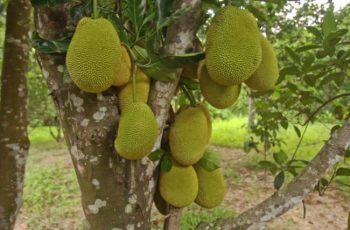How To Start Lemon Farming In Nigeria: Your Simple Guide

Lemon farming in Nigeria is a guaranteed agribusiness investment that will make good money for you. As a serious lemon farmer who puts in the needed effort into his/her business, your bank account will definitely experience exponential growth. Lemon belongs to the citrus family like orange, lime, grapefruit, and tangerine. You need to know that lemon farming in Nigeria requires patience because it is a tree crop.
Read: How to start an orange farming business in Nigeria
Just like other citrus trees like orange, grapefruit, etc, lemon reaches maturation and starts fruiting between 3-6 years. You can see that lemon farming in Nigeria is not a get rich quick business scheme. There is a need for you to gradually build and develop your business to start yielding profits. However, the length of time it will take for the lemon tree to start yielding fruits depends on the variety.
The focus of this article is to guide you on how to start your lemon farming in Nigeria with ease. So, all the right information you need to succeed in your lemon farming business in Nigeria is contained here. You just sit back and enjoy your reading.
Why Start Lemon Farming In Nigeria?
In Nigeria, lemon has a high market value due to its nutritional and economic benefits. They are rich sources of vitamin C that improves your immune system. You can consume lemon in different ways like peeling off the back and drinking the juice. Lemon can also be used for the production of lemonades as well as marmalade. The good news about lemon farming in Nigeria is that you can cultivate lemons in any part of Nigeria.
With the population of Nigeria placed above 180 million, you will agree with me that there will always be a market for your lemons. The weather condition of Nigeria is also very good for your lemon farming in Nigeria.
Difference Between Lime And Lemon
As with most people, you might be a little bit confused about the difference between lime and lemon. Well, for a start, limes are green and smaller whereas lemons are yellow and big in size. Although limes and lemons are from the same citrus family, they have a different flavor, color, and come in different sizes.
Lemon-tree grows up to 6-8 meters tall whereas the lime tree is a shrub that grows from half a meter to two meters in height. The lemon fruit originated from India while the “birthplace” of lime is Malaca Peninsula in Southeast Asia. With the aforementioned difference between lime and lemon, they still have lots of things in common.
Center for Production of Lemon in Nigeria
The center for the production of orange in Nigeria is Benue state. You should also note that the state is also known for the large production of lemon and other citrus fruits in Nigeria. In fact, it is not by mistake that the Benue state is called the food basket of the nation. So, when you talk about the center for the production of orange in Nigeria as well as lemon, Benue should come to mind.
Also read: How to start watermelon farming business in Nigeria
Requirements for Starting your Lemon Farming in Nigeria
Before you venture into lemon farming in Nigeria, there are certain things you need to put in place. Below are the major requirements you need for your lemon farming business:
-
Well-detailed business plan
You wouldn’t want to start your lemon farming in Nigeria without a good business plan in place. With a good business plan for your citrus farming venture in Nigeria, your chance to succeed is greatly improved. The same way the compass guides the sailor on his voyage is how your business plan will guide you in this business.
Your business plan will also aid you in your quest for agricultural loans from the government, private institutions, or individuals. For your lemon farming in Nigeria, no investor will look the way of your business without a business plan.
-
Your land selection and preparation
Choosing a suitable land for your lemon farming in Nigeria is very vital and important to the success of the business. The reason is that your choice of land has the ability to impact either positively or negatively on how your trees will grow. You should go for a sandy loam soil with good content of organic matter.
Another way you can check how good soil would be is to take a look at other trees on the land. When trees around are doing very well, it is evidence that such soil is likely to favor your lemon trees. Before selecting a particular land, you need to ensure the soil is well-drained as citrus trees do not do well on waterlogged soil.
See: How to start grapefruit farming in Nigeria
You can check the drainage capacity of the soil by digging a hole 2 meters in depth and I meter in diameter. After digging, fill it with water and observe for a few days. If the water takes more than 48 hours to drain, then you need to avoid such soil. The ideal time for the water to drain should be between 24 to 36 hours.
You are advised to purchase the land for your lemon farming in Nigeria from remote areas as it is cheaper.
-
How to plant your lemon trees
For your lemon farming in Nigeria, you can plant in two different ways. You can either grow your lemon plants from the seeds or you can decide to buy young trees from nurseries. When buying the seeds, you need to ensure that it is the desired variety. There are the dwarf and standard varieties of lemon plants. If you are going to use the seeds, they need to be harvested and soaked in water overnight.
You should prepare the nursery and the seeds planted half an inch deep into the soil. Pack sandy loam soil that is rich in organic matter into the polythene you want to use for the nursery. You should puncture the polythene to allow easy drainage of water. Your lemon seeds should be watered daily after you have completed the planting process. The lemon seeds should be able to germinate within 2 weeks or 14 days under good conditions.
After germination, you should allow the young plants to remain in the polythene bag for up to 3 months. You can now transplant to the permanent site. It is important that you fence the farm to keep animals away from the young trees. For the spacing of lemon trees in the farm, you should give a space of between 6 to 10 feet for dwarf varieties. The standard varieties of lemon require a spacing of 12 to 25 feet apart for the blossoming of the plants.
-
Caring for you your lemon trees
As stated earlier, lemon farming in Nigeria is not a get rich quick agribusiness investment. The lemon tree takes between 3 to 6 years to attain maturation and fruiting. You need to take proper care of the lemon before maturation. There are certain diseases that attack citrus trees of which lemon is part of.
Some of the diseases that attack lemon trees include citrus canker that causes lesions on the fruits. The citrus mold is also responsible for the blackening and wilting of the leaves. Citrus tristeza causes stunted growth on the lemon plants. For the proper way to tackle these diseases, you need to contact the ministry of agriculture in Nigeria for proper guidance.
-
Marketing strategy
Before your lemon attains maturation, you need to carry out good research on how to market your fruits. You can contact fruit juice manufacturing companies in Nigeria for the sale of your product or the retailers in the local market.
ATTENTION…
For your business plan on lemon farming in Nigeria or any other business niche, contact us on +2347037281050. Your business plan will be ready within 2 weeks of your order as our team works round the clock to give you the best.
For your contributions and questions regarding lemon farming in Nigeria, kindly make use of the comment box below. THANKS

